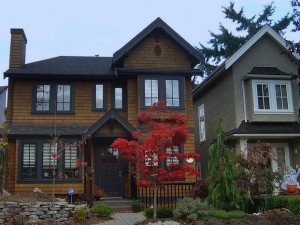Vancouver imobiliário: Bolha ou não?
 Anyone who’s been thinking about de se mudar para Vancouver — or anyone trying to find a place to live in B.C.’s largest city — can’t help but wonder about local real estate prices.
Anyone who’s been thinking about de se mudar para Vancouver — or anyone trying to find a place to live in B.C.’s largest city — can’t help but wonder about local real estate prices.
The current average price for a house in metropolitan Vancouver is nearly $800,000, de acordo com a Câmara de Imóveis da Grande Vancouver.
And if you’re hoping to live on Vancouver’s West Side, prepare to spend double that amount. Westside detached homes are now averaging almost $1.7 milhões.
Com os preços altos este, perhaps it’s not surprising that a recent Globo & Mail article wondered, “Is Vancouver in a real estate bubble?”
Yet despite the headline, the article gives relatively little space to real estate price trends and much more ink to the effect of overseas buyers, particularly those from Asia, on Vancouver’s real estate market.
Claro, Vancouver’s popularity with wealthy Chinese investors isn’t news. A Globo & Mail peça acknowledges as much and argues that:
The torrid affair between eastern Asia and Vancouver real estate, agora na sua terceira década, is actually a love triangle from which each party derives very different things.
When wealthy Chinese immigrants buy property in Vancouver—and they utterly dominate the top end of the market—they’re actually buying a form of insurance.
What the federal and provincial governments get out of these newly minted Canadians turns out to be a modern form of the infamous head tax that was imposed on Chinese migrants in the 19th century.
And what Vancouver gets is an economy that boasts a lot of froth, e não à substância muito.
Desde Vancouver is consistently ranked among the best places in the world to live, perhaps it’s not surprising, como o Globo article says, que “Vancouver is popular as a lifestyle destination for those who can afford it—not as a place to make a living. More ambitious immigrants, Asian and otherwise, são mais propensos a escolher Toronto.”
Na verdade, British Columbia (which essentially means Greater Vancouver) recebe cerca de 15% of all Canadian immigrants, que, given its population, is only slightly more than its proportional share.
Por outro lado, torna-se cerca de metade da anual 10,000 or so people who can prove they are already wealthy and therefore eligible for easier, if more expensive, passeios no entrepreneur e investidor aulas. E o resto de Vancouver 15% share fits a distinctly different profile than do immigrants to places like Toronto and Montreal: more skilled and better educated, e muito menos provável que chegam como refugiados.
Perhaps Vancouver is becoming such a cool place to live that — as in other high-priced cities like New York or Paris — people will squeeze into ever-tinier spaces to live the “Vancouver lifestyle.”
O que você acha? Is the Vancouver real estate market in a “bubble” that’s going to burst?
Ou will Vancouver continue to be a wildly popular place to live, regardless of the housing costs?
Deixe um comentário e deixe-nos saber. E please post tips for newcomers to Vancouver who are looking for an affordable place to live! Graças.
* * * * *
ATUALIZAÇÃO: De acordo com o RE/MAX Housing Market Outlook 2011, residential home prices are expected to climb further across Canada in the coming year. Além, “Markets in British Columbia are forecast to lead the country in terms of percentage increases in sales activity next year, com maior Vancouver esperado para subir 10 por cento…” Bolha ou não?
Vancouver de casa por pnwra (Flickr)





















Vancouver real estate prices are dependent on Canada’s terms of trade and those are determined largely by commodity and energy prices. I believe, and I may well be wrong, that China will at some point in the next few years experience a serious economic slowdown as a result of their own over investment in construction and residential real estate similar to what happened in S.E. Asia prior to the Asian financial crisis of 1997. If this were to happen it would trigger a major deflation of commodity prices and have very serious detrimental effects on Canada’s terms of trade. Incomes would fall and the ability to finance already stretch levels of personal debt would start to crack. Vancouver, already too dependent on real estate would be on a roller coaster ride down with servere implications for already inflated prices and the local economy.
I’m not an economist, so it’s hard for me to know how all these factors would affect the housing market in Vancouver. If the Chinese economy does slow down, as you suggest, I wonder whether that will reduce the ability of Chinese families to buy property in Vancouver. Or whether these well-to-do investors will be sheltered from the downturn?